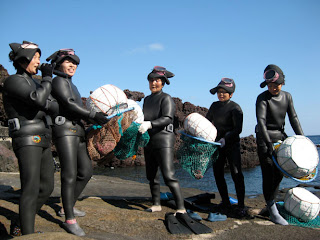Before visiting Jeju, all I’d heard that the island was the Hawaii of South Korea. I heard about the local sex and teddy bear museum (separate entities) and not much else. I knew it as a place for lovers and honeymooners—and, of course, the foreign faculty from Kosin University on an all-expenses-paid retreat.
But no one mentioned that Jeju is famous for having women so badass they make Russian Women’s Battalion of Death look like conservative schoolmarms advocating female disempowerment. There’s a saying on Jeju island that says, “Have a baby girl and we will throw a pork barbecue party; have a baby boy, and we will kick his ass.” Hundreds of years ago, these women overturned centuries of Confucian thought to become the main breadwinners of the family.
The Jeju women, called haenyo (or “sea women” or “mermaids of Jeju”), are skilled divers who farm the sea for anything they can catch such as abalone, conch, and octopuses. This taxing job was once held by the men on the island, until it became unprofitable due to high taxes—or until they died leaving their wives and children to fend for themselves. The Jeju women, who were not taxed, picked up the tools on the trade and shouldered on while the men stayed home and raised the kids.
These “tools of the trade” neither include very much that protect the women from frigid temperatures, sharks, and jellyfish, nor are they helpful when it comes to breathing underwater. Wearing a lead-weighted vest or belt and (a recent upgrade) a wetsuit, the haenyo need only a float to mark their location and three metal tools: a flat metal stick to pry abalone rom the rocks, a metal blade with a 90-degree curve (used for dragging octopuses out of lairs), and an all-purpose hook for shellfish and other prey. They dive for roughly two minutes at a time, popping up every so often to deposit their catch into the buoys. There they give a distinct whistle, a unique way of breathing out carbon dioxide and breathing in fresh oxygen.
Up until the 1950s, there were as many as 30,000 haenyo, but now their numbers have dwindled to around 5,000. But still, that’s 5000 grandma’s working a forty-hour week diving up down in the crashing waves of Jeju island. Most people agree that the haenyo are dying out because they have sent their daughters off to college and better prospects. For some reason, Jeju’s younger generation of women now chose to work in an office rather than suffer the stress of sharks, jellyfish, and holding their breath for two straight minutes to swim down 20 meters to catch octopi with a curved blade.
There is another saying on Jeju island about the difficulty of the life of haenyo that goes like this: “Better to be born a cow than a woman.”




Wow. That is really cool. And informative. You tricked me into learning something!
ReplyDelete